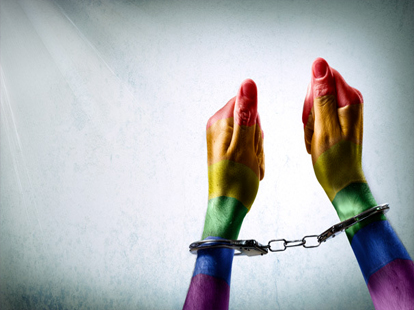
Intolerance towards LGBTI people in Criminal Executive Institutions of Armenia
Many of us do not realize what problems LGBT people face every day, believing that it is enough to just accept their lifestyle and that the issue of human equality will be solved. But is the problem so superficial? Imagine being a full-fledged member of the society but not being able to meet simple human needs, such as having a family, children, loving and being loved… even by family members. For the vast majority of members of our society, these questions are simple everyday decisions that each individual makes for themselves, but it is not the same for the representatives of the LGBT community.
However, we are not going to discuss this issue today. Society, in general, either accepts or disapproves a person’s sexual orientation and gender identity. Which are in both cases discriminatory, as these features shall not be subject to discussion. The epicenter of such behaviors can be considered every penitentiary in Armenia, where the rules of the criminal subculture have long been established, and those who do not follow those rules are labeled and pushed out of the normal rhythm of the institution’s life.
Even the free members of the community face stereotypical ideas every day, and in the prison cell they get into the worst situation ever: being tortured and neglected.
We have talked with previously imprisoned LGBT people, members and head of the Group of Public Monitors Implementing Supervision over the Criminal-Executive Institutions and Bodies of the Ministry of Justice of Armenia to discuss and raise awareness on this issue.
Let’s consider two stories which we give us a certain picture of the lives of LGBT people in criminal executive institutions of Armenia.
Karen (his name is changed by his request.), who is a representative of the LGBT community, was arrested in 2015.
Transgender woman Lilith was detained in a penitentiary institution in 2017-2019. The case is still under legal proceedings. She tries to prove her innocence as there had been imprisoned without enough evidence for detention.
Both Karen and Lilith claim that the judge’s decision was partly discriminatory. However, this is not considered strong grounds to appeal the decision of the judge.
As soon as someone enters a penitentiary, everyone already knows everything about that person. They do not communicate with homosexual people, and they force them to keep their plates in a separate place, they limit their communication with other people.
Both Lilith and Karen fought for their rights. The latter even went on a hunger strike.
As Karen notes “First they involve you in their ‘criminal world’, then according to those beliefs, they classify you as a person of a low social class. «Lilith emphasizes ․ “I even had a pedophile in my cell, and we were treated the same way.” It turns out that pedophiles and LGBT people are classified as the same in penitentiaries. This is a slap in the face not only to the community but also to the institution where such “laws” triumph.
According to Karen, some people watched over everyone in the cells, like “dictators.” What does this mean? All prisoners are kept away from LGBT community members, they don’t even come close to the plates we use, don’t want to sleep in the same cell with us and wake up in the same room, but they don’t mind having sex with us and everyone should be informed about everything that happens in our cells. These are distorted values. And where do they find justification for these actions? Of course from the criminal world.
Even the members of the LGBT community are injected the thought that their outing in the prison is done in their own good. “If you keep it a secret and they find it out from anybody else, they will hurt you, and it will be very bad for you. It is in your best interest to be open” Lilith added. What is it, if not a violation of human rights? They have created rules, and they live according to them, and they use all those who can be oppressed by those rules for their pleasure.
“Yes, the problem is systematic, but, according to observations, it is more severe among men,” said Nare Hovhannisyan, a member of the Group of Public Monitors Implementing Supervision over the Criminal-Executive Institutions and Bodies of the Ministry of Justice of Armenia. And Hasmik Harutyunyan, the head of the Public monitoring group. Confirms that she has not personally noticed such a problem among women.
It should be noted that not everyone is ready to resist and demand request. So what about those who are not strong enough to resist? This question is still open!
They say the fish stinks from the head. Everyone in the penitentiaries urges the community to remain silent when they are insulted. However, Karen did not keep silent, he struggled in different ways and heard from the employees of the penitentiary that soon it would be impossible to ensure his security if he kept on acting this way. It turns out that those who have the opportunity to set order in prison play by the same rules too. Instead of solving the problem from the root, they try to eliminate the consequences.
Hasmik Harutyunyan confirms this, and Nare Hovhannisyan adds, “For example, a special position should be set for sanitary and hygienic work, but the state does not consider this issue, as an application must be submitted in person to carry out such work. But how is it that only LGBT people express a desire to do such work? ” Again, expectations are shattered against the same wall. The question is almost rhetorical.
A huge problem is the attitude of the prison staff. Lilith attempted suicide by injecting saliva in her leg, and no one provided her with medical care neither did they call an ambulance until they were informed that the public monitors were coming. The public monitors saved her life. But the other hero of our interview has a different opinion. “Zero attitude, actions. They just come, sympathize, and leave” he said.
The impression may be like that, but the public mentors’ reports show the most urgent problems, starting from the conditions in which even just habitation is insulting to the regulation of internal norms. They see the problems, and they talk about it, but nothing more is done. Nare notes that their work is more complicated in the case of LGBT people, as the Ministry of Justice must first acknowledge the existence of the problem, accept that this problem is really a problem. In other words, we are again having trouble with awareness and consciousness, this time on a state level.
Another serious problem is being in a double discriminatory situation. Before her arrest, Lilith was involved in remote texting occupation and sex work due to problems that arose after she opened up about her gender identity. She still has a problem integrating into society after she has come out from the penitentiary. “Having a good command of Armenian, English, Russian, Greek, and Ukrainian languages, I hear everywhere that they have already found an employee.” Now she is engaged in works of selective breeding of animals and has been forced to return to sex work, which she does with disgust, also taking antidepressants. Karen also has a problem integrating into the society.
In any case, much depends on the arrested person. Lilith is sure that “living in the society, there are rules that you must keep, otherwise be ready to be hit. «On the contrary, Karen insists that anyone who approaches with “clichés” should be retaliated. As a rule, some people like Lilith, toughen up and adapt to the situation, while others begin to fight more vigorously inside the prison and, of course, in freedom.
However, as Nare notes «The issues we have raised are systematic. Globally, there is no positive tendency. ” NGOs can help us in our social activities. We talked with Sergey Gabrielyan, President of New Generation Humanitarian NGO. He also made special emphasis on state bodies, but he also talked on the important role of NGOs in solving this problem. “NGOs work with different groups and know the sectorial problems best as well as the solution mechanisms for them. The membership and involvement of NGOs should be encouraged in the existing and functioning councils established in the state bodies. However, there are gaps in that process. Places are limited, and inclusion mechanisms and standards are incomprehensible, which in turn hinders the involvement of NGOs. ”
It also became clear from the conversation that the NGOs raise many issues registered by the group of public monitors too; the voicelessness of LGBT people is not even considered to be abnormal. No places are allocated for LGBT people in consultative councils adjacent to state bodies. It is especially unfortunate that until now, MSM and Trans* people have not been included in Country Coordinating Mechanism for the HIV and AIDS Prevention Programs (CCM). It turns out that the CCM makes decisions, the direct bearers of which are MSM and Trans* people, but they are left out of the decision-making processes, «Sergey added. This is also a very important issue for LGBT prisoners, as Lilith says that every third person in prison has a sexually transmitted infection (STI).
“It’s just such an absurd situation, isn’t it? Yes, the problems are many and large-scale”, according to Sergey, New Generation Humanitarian NGO President “and we, human rights activists, do everything possible to protect the rights of LGBT people in all circles and bodies. But it is necessary to understand and accept one simple thing that everything will be in vain if the states, the executive and legislative bodies, do not have the political will…
1 ․ to make changes in Armenia
2 ․ To make the voices of human rights defenders and LGBT people heard, involving human rights organizations dealing with their issues, allowing them to be involved in various Consultative councils and bodies, and express their views in that decision-making processes. ”
Of course, we should not sit and wait for the state to pay attention to the mentioned issues. As Nare points out, “It doesn’t matter how many times you raise your voice, you have to keep the issue on the agenda all the time.” One day the ice will melt.
It is important to realize that the problem concerns each of us because we are all members of this society and only by speaking out we can achieve results. If the authorities see that we give enough importance to each such problem, then, with slow but steady steps, we may have a society where it would be shameful to invade into the private space of people and predetermine what position that individual should occupy in the society.
As long as only the opinion of the majority is considered to be correct, the minority should express its point of view even louder.
After all, the weaker shall not always be blamed by the stronger.
Saty Avagyan
The compilation and publication of this material has become possible within the framework of the project on Capacity Building and Empowerment for Protection of LGBTI Human Rights in Armenia implemented by New Generation Humanitarian NGO with the financial support of the Norwegian Helsinki Committee. The contents of this article are the sole responsibility of the author, and do not necessarily reflect the views of New Generation Humanitarian NGO or the Norwegian Helsinki Committee.




